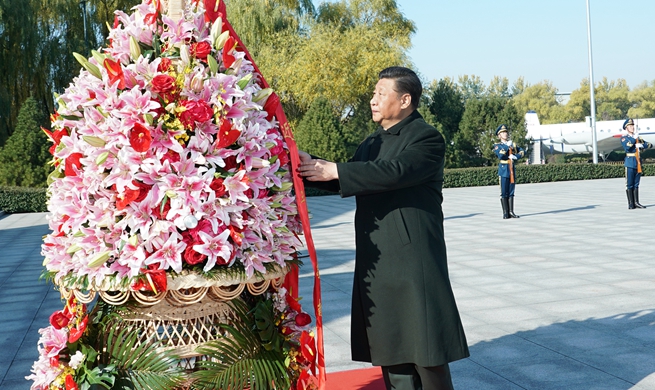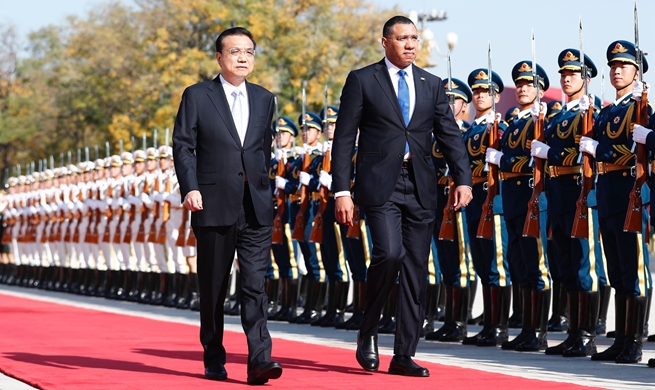by Dana Halawi
BEIRUT, Nov. 9 (Xinhua) -- Local experts hold different opinions on how to solve the U.S. dollar crisis in Lebanon and its impact on the Lebanese people.
The Lebanese pound has been pegged to the U.S. dollar since the 1990s and the exchange rate has always been fixed at 1507.5 Lebanese pounds per U.S. dollar.
For decades, Lebanon depended on remittances to sustain its economy and the fixed exchange rate.
However, the economic slowdown and the drop in cash injections from the Lebanese abroad reduced the central bank's foreign currency reserves, leading to a shortage in dollar for both businesses and individuals.
The demand for dollar has created a parallel market in which the dollar is being sold on the black market at more than 1,600 Lebanese pounds which is higher than the official exchange rate.
The purchasing power of the Lebanese people who get paid in Lebanese pounds has dropped, not to forget that panic in the market has increased, prompting depositors to either demand the exchange of their pounds to dollars or the transfer of their money outside Lebanon fearing the loss of their savings since the Lebanese central bank and commercial banks hold a good rate of the government's public debt.
Dan Azzi, advanced leadership fellow at Harvard University, told Xinhua that the first thing to do in Lebanon to solve this issue is imposing capital controls to prevent big clients from running away from the country.
Lebanese banks have previously announced that they won't impose any restrictions on capital movements, but this, in fact, is not the case today.
Banks put restrictions on the withdrawal of dollar, the exchange of pounds to dollars, and the transfer of money to other countries.
This has increased panic among depositors who resorted to withdrawing some amounts of their savings to store them in their houses.
But people's fear may eventually become real as the solution, in Azzi's belief, must include a haircut on the accounts of people because they are consuming the central bank's foreign reserves in many ways, but there remains a decision to make:
"Which accounts should be targeted by the haircut? Will people with small accounts be hurt? Or strictly the accounts above 1 million U.S. dollars?" Azzi asked.
He added that the government then can go for a currency devaluation because the poor will accept the austerity measures when they see that rich people lose money too.
Azzi argued that after adopting such measures, devaluation won't be a big problem because 40 percent of the Lebanese youths are unemployed and won't be impacted.
He also noted that Lebanon must reduce dollarization by imposing taxes on imported goods and encouraging people to consume locally-produced items.
Azzi's remarks were reiterated by Layal Mansour, an economist and lecturer at the Lebanese American University, who said one solution to the dollar crisis in Lebanon is the reduction in dollarization rate which has reached 72 percent.
Previous studies done by renowned economists in the world, such as Vincenzo Denicolo and Barry Eichengreen, suggest that a high dollarization rate weakens a country and makes it financially fragile.
Mansour suggested gradually reducing the dollarization rate which can happen by increasing confidence of the Lebanese people in their country through changing corrupted politicians, adopting transparent reform measures, strengthening local production and increasing the country's exports.
She also suggested a solution as resorting to a fully-dollarized economy.
"When the country fails in providing stability and trust for its currency, it would be better to replace its local currency with a foreign currency especially when we already have a high dollarization rate of 72 percent," Mansour said.
Meanwhile, she is totally against floating the Lebanese currency because removing the peg to the dollar with such a high dollarization rate will lead to a disaster.
"If the Lebanese pound is allowed to float amid the different uncertainties, including geopolitical risks and internal political disagreements, the currency will express at every second its vulnerability by fluctuating several times a day," Mansour explained.
For his part, Azzi believes that although the Lebanese pound is not considered to be pegged to the dollar anymore, this has not been announced officially, to avoid more panic in the market.
"Now our currency is floating but it was not announced. Only a limited amount of U.S. dollars are given to people at 1,515 Lebanese pounds per dollar for basic commodities such as bread, medication and fuel," he added.

















